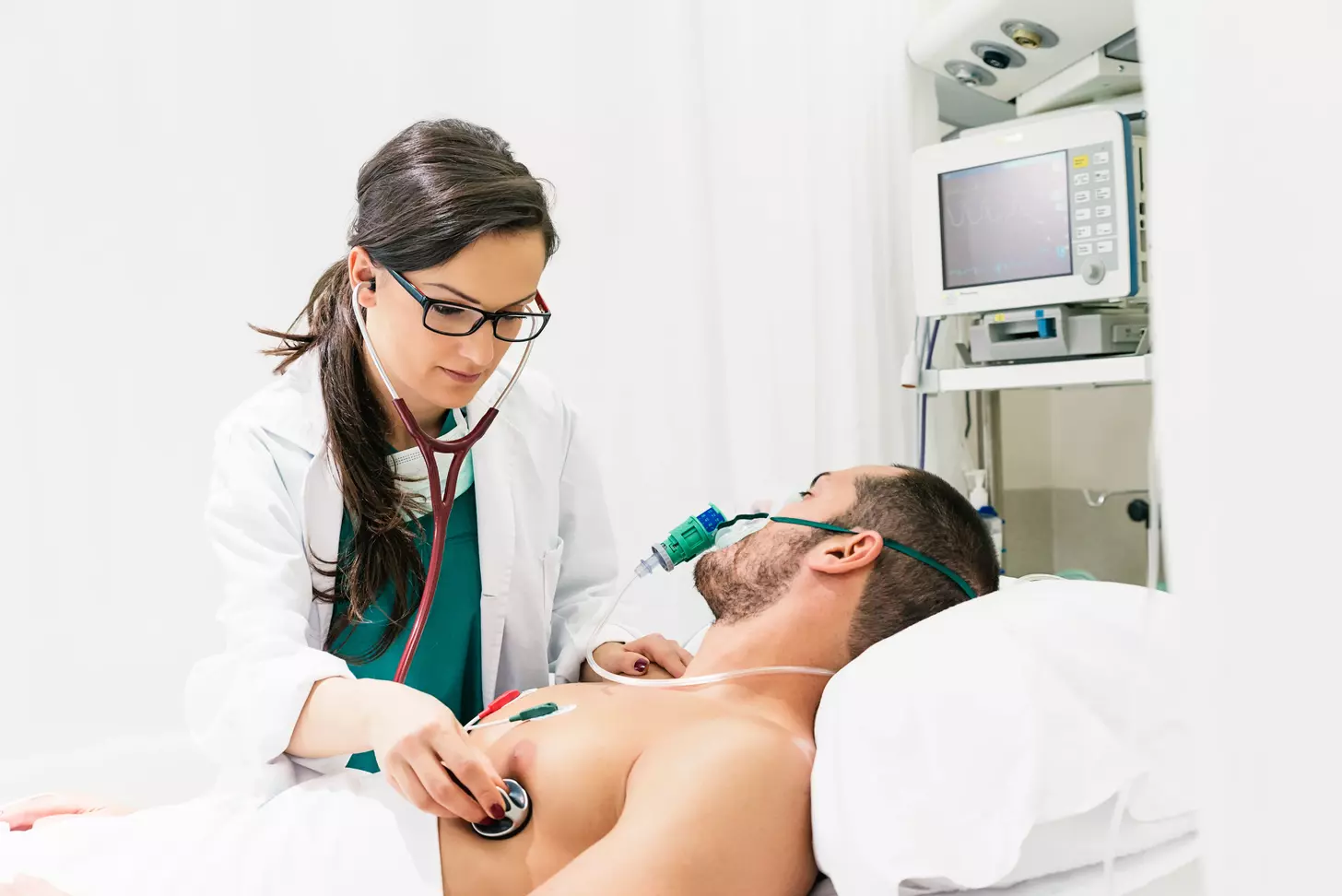Major abdominal surgery is a big deal in medicine. It’s needed for serious conditions. These include severe trauma, life-threatening infections, cancers, bowel blockages, and problems from chronic diseases. Proper fluid management is also critical during and after these surgeries to ensure patient stability and recovery.
A study looked at nearly 4 million cases in adults over 50. It found that about 64% of major abdominal surgeries were planned. Knowing about these conditions helps both patients and doctors make better choices.

At places like LivHospital, they use open abdominal surgery and new techniques for tough cases. The need for these surgeries is growing. This is thanks to new medical tech and team care.
Key Takeaways
- Major abdominal surgery is needed for serious issues like severe trauma and cancers.
- About 64% of major abdominal surgeries in adults aged 50+ are planned.
- Problems like bowel blockages and chronic disease complications also require major surgery.
- New surgical methods and team care are changing major abdominal surgery.
- Hospitals like LivHospital are at the forefront of advanced surgical care.
Understanding Major Abdominal Surgery
Major abdominal surgery is serious and requires careful care. It includes many complex procedures for treating different conditions in the abdomen.
We do many types of surgeries, like segmental colectomies and small bowel resections. These can be planned or urgent, each with its own challenges.
Definition and Types of Procedures
Major abdominal surgery involves operations on organs like the intestines and liver. The procedures range from removing parts to reconstructing or transplanting organs. It’s key for patients to know what to expect and for doctors to provide the best care.
Some important surgeries include:
- Segmental colectomies: Removing a part of the colon.
- Small bowel resections: Taking out a part of the small intestine.
- Abdominoperineal resection: A complex surgery for rectal cancer.
- Repair of parastomal hernias: Fixing hernias around stomas.

Emergency vs. Elective Surgery Statistics
Emergency and elective surgeries differ in major abdominal surgery. Emergency surgeries are urgent, while elective ones are planned. Knowing the stats can help understand the common conditions and outcomes.
Emergency surgeries are riskier because they’re urgent. But elective surgeries can have better outcomes because they’re planned. This allows for better preparation and care.
Fluid management is key in both emergency and elective surgeries. Proper fluid therapy helps keep patients stable and aids in recovery. We follow guidelines to ensure our patients get the best care.
Traumatic Injuries Requiring Immediate Surgical Intervention
Abdominal trauma, whether blunt or penetrating, needs quick surgery to avoid serious problems. Such injuries can happen from accidents, falls, or physical attacks. They can harm organs like the liver, spleen, and intestines.

Blunt Abdominal Trauma
Blunt trauma hits the belly without making an open wound. It’s risky because it can hurt internal organs without showing it right away. We use special tests to see how bad the injury is and if surgery is needed.
Things like car crashes, sports injuries, or fights can cause blunt trauma. The force can bruise, rupture, or bleed internal organs. This means patients need quick medical help.
Penetrating Abdominal Injuries
Penetrating injuries have an open wound into the belly, from stabbings or gunshots. They need fast surgery to stop bleeding, fix damaged organs, and stop infections. Varon David N MD and others are trained to handle these urgent situations.
Handling penetrating injuries means a detailed plan. First, we check the patient, then we start treatment and surgery. Our goal is to keep the patient stable, fix life-threatening issues, and get them back to normal.
In short, both blunt and penetrating injuries need fast action to avoid big problems. We stress the need for quick surgery.
Life-Threatening Infections and Inflammatory Conditions
Life-threatening infections and inflammatory conditions in the abdominal cavity need quick medical help. They can come from bacteria, injuries, or past surgeries.
We’ll look at two serious conditions: peritonitis and abdominal sepsis, and severe appendicitis and abscesses. Knowing about these is key to giving the right medical care fast.
Peritonitis and Abdominal Sepsis
Peritonitis is when the peritoneum, the lining of the belly, gets inflamed. It’s often from a bacterial infection, like a burst appendix or stomach ulcer. Abdominal sepsis is a big infection in the belly that can hurt organs if not treated right away.
To treat peritonitis and abdominal sepsis, doctors do surgery and give antibiotics. Surgery is needed to fix the problem, like removing a burst appendix. Studies show quick surgery helps a lot.
Key treatment steps include:
- Quickly finding out how bad the infection is
- Surgery to fix the infection’s cause
- Antibiotics to fight the bacteria
- Helping the patient with fluids and watching for problems
Severe Appendicitis and Abscesses
Appendicitis is when the appendix gets inflamed. If not treated fast, it can get worse. This can lead to an abscess, a pocket of pus that’s very painful.
For severe appendicitis, taking out the appendix is usually the best option. If there’s an abscess, doctors might drain it through surgery or a special needle under X-ray.

Handling these serious cases needs a team effort from doctors, radiologists, and others. Quick and right treatment makes a big difference. This is shown in top medical journals like JAMA Surgery, which share the latest in treatment and results.
Abdominal Malignancies Requiring Surgical Resection
Abdominal cancers often need surgery as a key part of treatment. These cancers can start in different parts of the abdomen, like the colon, stomach, and pancreas. Each one needs a special surgical plan.
Colorectal Cancer
Colorectal cancer is a common type that needs surgery. The surgery type depends on the tumor’s stage and where it is. Early-stage colon cancer might get minimally invasive surgery. But, more serious cases might need open surgery.
A study in BMC Anesthesiology found fluid in surgery is very important. Giving a liberal amount of fluid helps keep organs working well. It can also make recovery faster and reduce complications.
Gastric Cancer
Gastric cancer, or stomach cancer, also needs surgery. The surgery type depends on the tumor’s location and stage. Partial or total gastrectomy might be done, along with removing lymph nodes.
Pancreatic Cancer
Pancreatic cancer is hard to diagnose and treat. The Whipple procedure is a complex surgery for it. It removes the tumor and parts of the pancreas, stomach, and small intestine. Surgery depends on if the tumor can be removed and the patient’s health.
Other Abdominal Tumors
Other tumors in the abdomen, like liver, gallbladder, and small intestine cancers, also need surgery. The surgery type depends on the tumor, its location, and the patient’s health. New surgical methods and care before and after surgery have made treatment better.

In summary, surgery is key in treating many abdominal cancers. Knowing how to use fluids during surgery is important for patient care. Tailoring surgery to each patient’s needs can improve their life quality and treatment outcomes.
Gastrointestinal Emergencies and Complications
Gastrointestinal emergencies can happen suddenly. They need quick medical help to avoid serious problems. If not treated fast, they can cause big health issues or even death.
We will look at three big emergencies: bowel obstructions, perforated ulcers, and mesenteric ischemia. Knowing about these is key for doctors to give the right care quickly.
Bowel Obstructions
Bowel obstructions block the flow of intestinal contents. This can happen for many reasons like adhesions, hernias, or tumors. Symptoms include very bad stomach pain, vomiting, and trouble going to the bathroom.
To fix bowel obstructions, surgery is often needed. It helps get things moving again. Sometimes, fluid management is also important, like when there’s fluid in the abdomen after surgery.
- Adhesions and hernias are common causes of bowel obstructions.
- Surgery is usually needed to fix the blockage.
- After surgery, watching for problems like infection is important.
Perforated Ulcers
A perforated ulcer is a big emergency. It happens when an ulcer goes through the stomach or intestine wall. This can cause peritonitis if not treated right away. Symptoms include sudden, very bad stomach pain, fever, and nausea.
Quick surgery is usually needed to fix the hole and clean the belly. After surgery, liquid infusion therapy, like in Melbourne, helps manage fluids and aid in recovery.
- Perforated ulcers need fast diagnosis and treatment.
- Surgery is often needed to fix the ulcer and any infection.
- Fluid management after surgery is key for getting better.
Mesenteric Ischemia
Mesenteric ischemia happens when blood flow to the intestines stops or slows down. This can cause damage and even death if not treated fast. Symptoms include very bad stomach pain, often after eating, and can lead to shock.
Quick diagnosis and treatment are vital to get blood flowing again. This can be done through surgery or other methods. Managing fluid balance is also important after surgery.
In summary, emergencies like bowel obstructions, perforated ulcers, and mesenteric ischemia need fast action to avoid serious problems. Good care, including surgery and after-care, is essential for better patient outcomes.
Chronic Disease Complications and Bariatric Surgery
Chronic diseases like Crohn’s disease and diverticulitis need a detailed treatment plan. We will look at these conditions and how surgery, including bariatric surgery, helps. This is true for those with severe obesity.
Crohn’s Disease and Diverticulitis Complications
Crohn’s disease is a serious inflammatory bowel disease. It can lead to bowel obstruction, abscesses, and fistulas. Surgery is often needed to treat these problems and stop further damage.
Diverticulitis affects the colon when small pouches get inflamed. It can cause abscesses, perforation, and peritonitis. These serious issues might need surgery. A timely and right med regime is key to managing these conditions.
- Bowel obstruction
- Abscesses and fistulas
- Perforation and peritonitis
Bariatric Surgery for Severe Obesity
Bariatric surgery is a good option for severe obesity. It leads to significant weight loss and better health. Doctors like Samuel Idarraga MD say it improves metabolic health and lowers obesity risks.
Choosing bariatric surgery is a big decision. It depends on the patient’s health, obesity level, and their readiness for lifestyle changes. We help patients choose the best surgery and support them every step of the way.
“Bariatric surgery is a life-changing procedure that not only helps patients lose weight but also improves their overall health and well-being.”
Expert Opinion
In summary, managing chronic diseases and severe obesity with bariatric surgery is vital. We aim to give our patients the best care, tailored to their needs.
Fluid Management Protocols in Major Abdominal Surgery
Fluid management is key in major abdominal surgery for the best patient results. Surgeries for injuries, cancers, and emergencies need careful fluid plans. This helps avoid problems and aids in recovery.
Preoperative Assessment and Preparation
Before surgery, we check patients’ fluid levels. We look at their medical history, current meds, and lab results. This helps spot risks of fluid imbalance.
Patients getting major surgery often need their fluid levels optimized before surgery. This helps lower the chance of problems during and after surgery. We might give IV fluids and fix electrolyte imbalances.
Intraoperative Fluid Therapy Guidelines
During surgery, we follow rules to keep fluids balanced. We aim to keep vital organs well and avoid too much fluid. We use goal-directed fluid therapy, guided by heart monitoring to improve heart function.
- Monitoring of vital signs and urine output
- Use of advanced hemodynamic monitoring tools
- Adjustment of fluid administration based on surgical blood loss and other factors
Postoperative Fluid Balance and Monitoring
After surgery, keeping fluids balanced is vital for a smooth recovery. We closely monitor patients’ fluid status and adjust their fluid plan as needed.
Post-surgery, we manage IV fluids, electrolytes, and nutrition to help healing. We also watch for signs of too much or too little fluid, making changes as needed.
Conclusion
Major abdominal surgery is a complex field. It needs a deep understanding of the reasons for surgery. We’ve looked at conditions like injuries, infections, and cancers that lead to surgery. These are key parts of a major abdominal surgery list.
Managing fluids well is key to good patient care. We’ve talked about how to replace fluids effectively. This helps patients get the best results. Patients and doctors can work together better with this knowledge.
Planning and doing surgery well is very important. We stress the need for a full care plan. This includes checking patients before surgery and watching them after. This ensures the best results for patients.
FAQ
What is major abdominal surgery?
What are the different types of major abdominal surgery?
What is the role of fluid management in major abdominal surgery?
What is a liberal amount of fluid administration during surgery?
How is fluid in the abdomen managed after surgery?
What are the guidelines for fluid replacement during major abdominal surgery?
What is the impact of surgical treatment on patient outcomes in major abdominal surgery?
What are some examples of chronic diseases that can lead to complications requiring surgical attention?
Where can I receive specialized care for liquid infusion therapy?
References
- Oodit, R., et al. (2022). Guidelines for perioperative care in elective abdominal surgery. Annals of Surgery. https://www.ncbi.nlm.nih.gov/pmc/articles/PMC9154207/
- Scott, M. J., et al. (2023). Consensus guidelines for perioperative care in emergency laparotomy: Enhanced recovery after surgery (ERAS) Society recommendations. World Journal of Surgery. https://www.ncbi.nlm.nih.gov/pmc/articles/PMC10241558/






